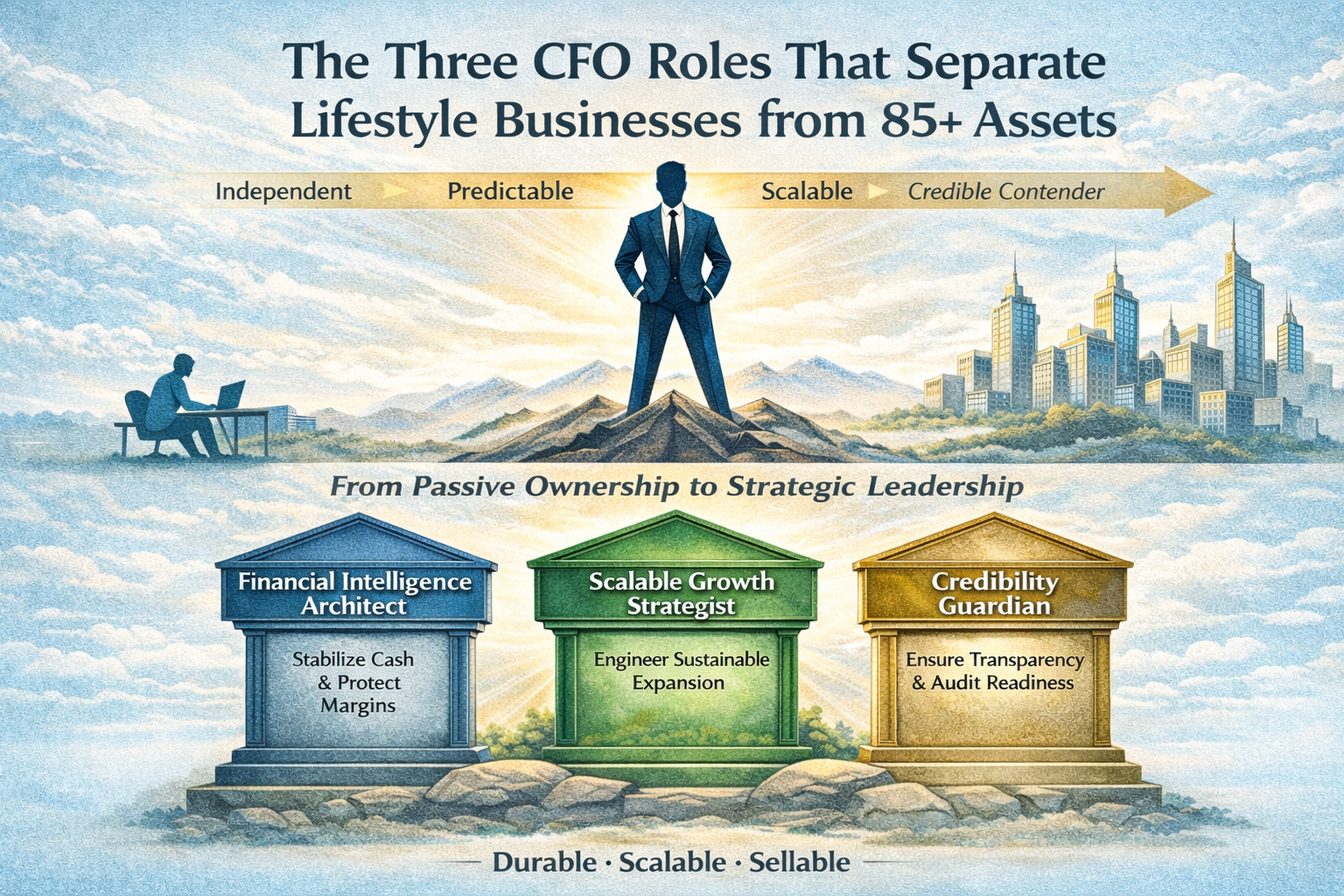The Three CFO Roles That Separate Lifestyle Businesses from 85+ Assets
Private capital markets do not buy history.They buy confidence. The 85+ Strategic Capacity Asset Class represents businesses that operate at...
3 min read
George Sandmann, Founder
:
Jul 18, 2024 8:39:01 AM
Are you discussing business value with your clients? Here are three things you might help your clients understand - applying ‘small f’ fiduciary standards, natch.
Three points about business value your clients need to know:
Teaser: these are three points on which you can educate your client using Growth-Drive’s new Strategic Capacity & Business Value Report. You can download an excerpt at the end of this post.
Before we go there… Lots of folks are talking about the ‘Value Gap’. The value gap is the delta between what a business would be worth at top value, and what someone might actually pay after completing due diligence. The value gap is the difference between dreams and reality. And as business advisors we are making dreams come true, right?
I’ve been working in this ‘value gap’ field for 13 years and counting. Calculating business value -accurately- using market data is my thing. I’m a passionate geek about it. And I’m a geek about making value actionable*. This is why The Growth-Driving Advisor book and the CLARITY Strategic Capacity Analysis software exist. In both, we share the methodology, process, and OKRs through which you can lead clients to growing profits and value.
Others seem to like our approach: it underpins a couple of us serving as value growth faculty for the NACVA, the IEPA, and is related to upcoming collaborations with BEI (CExP). [I’m really looking forward to seeing many of you at BEI’s August conference, during which, I'm leading a full-day workshop on biz dev, plus a break-out session on value growth.]
Do I know everything there is to know? Nope. But I do know that this is a serious topic, and that we as advisors have a ‘small f’ fiduciary responsibility to share accurate information with our clients. What’s “small f”? It’s our ethical duty to act in the best interests of others, even when not legally required to do so. Agree? Hell yes you do.
So here’s the basic question you might want to answer before discussing business value: “Is the number you’re sharing accurate? Like, within 5-10% accurate?” Is the value you're sharing calculated the way the private capital markets will calculate value? It should be if we are talking about price, am I right?
Here are two reasons accuracy might be important to you personally.
Case 1: You’re a wealth or insurance advisor, and you’re doing advanced planning or selling insurance based on a calculation of value. If the calculation is way high… sure, you’ll sell a bigger policy. And you’ll fail the “small f” test and put yourself at risk.
Case 2: You’re a business advisor -maybe an exit planner- and you create a strategic plan with the intent to sell the business for $20MM in 5 years. Now if your current calculation of value starts with a number that’s way too high, and you project increased future value based on that number… What will happen when your client goes to market? Heartbreak.
Now, why would I ask you about accuracy? Because I care, deeply. We are not in the business of promoting fairy tales. One thing is for sure: our community is committed to accuracy, and to making sure we are giving our clients reality-based advice.
Here are the cover, ToC, and pages 4 and 13 from our new STRATEGIC CAPACITY & BUSINESS VALUE REPORT. The Table of Contents tells the whole story. The report hits on the three things clients should know while starting the conversation about growing profits and value - you can grab your excerpt here. Do you want to know how the Growth-Drive market-based calculation of value compares to the methods offered by others? Happy to help - and the three leading methods are explained in this report.




Three summary thoughts:
Thanks. How do you feel about this topic? Comment here or shoot me a note.
Want to learn more? You can participate in a deep-dive workshop about calculating Strategic Capacity and Transferable Value at the Growth-Drive Summit, kids the current price expires at the end of this month.
Glad to help with questions, you can book a call anytime. -George
*The Value Gap is also the ROI your client can capture by working with you. You can share this ROI on a holistic or project basis by simply grabbing it out of CLARITY. Example: the total value gap is $12MM, and creating better Financial Reporting can have a $727,000 accretive impact. Your fee for getting it done is $50,000 - delivering a 14X ROI. Pros love this... and so do their clients.

Private capital markets do not buy history.They buy confidence. The 85+ Strategic Capacity Asset Class represents businesses that operate at...

Always reading. This week I’ve been thinking about Musk’s musings about Ai exploding productivity. We are already seeing it - our CLAIRE Ai™ can...

Tim Cook had a rule at Apple: Three sentences. Every meeting. “Before any discussion begins, the meeting opener must state three specific points to...